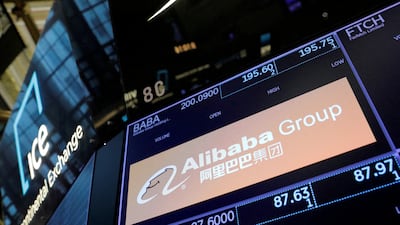About 200 US-traded Chinese companies are at risk of delisting if the accounting body overseen by the US Securities and Exchange Commission cannot complete audit inspections and investigations by early November, an SEC official said.
This timetable allows the US Public Company Accounting Oversight Board (PCAOB) time to assess if a company complies with its audit requirements by a year-end deadline, YJ Fischer, director at the SEC’s office of international affairs, said in a speech on Tuesday.
US-listed Chinese companies including Alibaba, Yum China and JD.com could be barred from trading on US stock exchanges as soon as early 2023 if they are deemed non-compliant with regulations.
“We are now at a critical juncture in the effort to resolve these audit access issues,” Ms Fischer said.
“About $1.7 trillion in securities of China-based issuers are listed on exchanges in the US. These securities could face trading prohibitions in as little as two years, which means the issuers of those securities will no longer have access to US capital markets because they are not in compliance with regulatory requirements.”
In December, the US securities regulator made it compulsory for Chinese companies trading on US stock exchanges to disclose if they are owned or controlled by a government entity and provide evidence of their auditing inspections.
“PCAOB-registered public accounting firms must provide the PCAOB with access to their audit work papers and any claim that audit work papers cannot be produced because they contain national security materials is questionable at best,” Ms Fischer said.
The SEC rule, which implements a law passed by Congress in 2020, seeks to rectify the decade-long problem of China’s refusal to let inspectors from the PCAOB to review audits of companies such as Alibaba, Baidu and Weibo.
The SEC deems non-compliance of Chinese companies a threat to US investors.
In August, the market regulator started issuing new disclosure requirements to Chinese companies seeking to list in New York as part of a push to boost investor awareness of the risks involved.
The SEC issued Chinese companies detailed instructions about greater disclosure of their use of offshore vehicles – known as variable interest entities, or VIEs – for initial public offerings, the implications for investors and the risk that Chinese authorities will interfere with company operations.
director, SEC's office of international affairs
There have been several rounds of talks between Chinese and US officials but the issue of access to accounts has yet to be resolved.
“Although there have been ongoing and productive discussions between US and Chinese authorities regarding audit inspections and investigations, significant issues remain and time is quickly running out,” Ms Fischer said.
Even if US and Chinese authorities reach an agreement in the near future to commence PCAOB audit inspections and investigations in China and Hong Kong, it will “only be the start towards satisfying the PCAOB’s statutory mandate”, she said.
A Chinese company or the relevant Chinese authorities should voluntarily delist a company if they deem the accounting information “too sensitive to comply” with PCAOB requirements.
However, Chinese authorities should allow other companies and auditors to comply fully with the PCAOB inspection and investigative processes, “allowing the remainder of China-based issuers to avoid potential trading prohibitions in the US”, Ms Fischer said.


